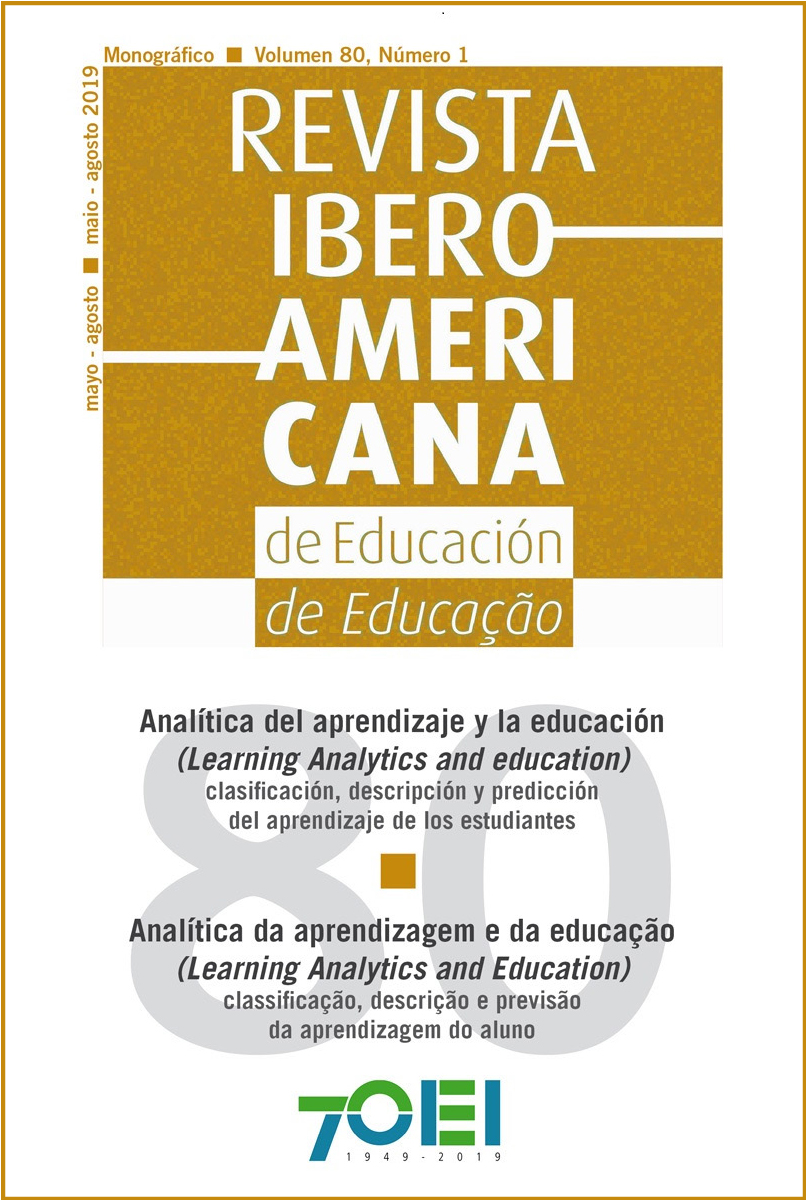Learning Analytics as digital culture of universities: Diagnosis of its application in the education system distance from the UNAM based on a complex scale
DOI:
https://doi.org/10.35362/rie8013455Keywords:
Learning Analytics, complex systems, digital culture, higher education, academic data management.Abstract
The article examines the results of the study about the implementation of Learning Analytics within eight divisions of the Open University and Distance Education System of the UNAM, as a way to analyze digital culture as digital praxis. For this purpose, an instrument was designed with a focus on complex systems (interactions, connections and, agents integration) that would allow the assessment of the state of the analytics from a scale of five levels based on the fields of knowledge proposed by Chatti, Dyckhoff, Schroeder and Thüs, H. (2012). It is proposed initially that universities have traditionally covered the basic level that is the management of data for internal informational purposes; However, educational stakeholders have begun to assign a broader and more comprehensive sense to the use of data in order to know their population and solve more complex problems. The conclusion of the text focuses on showing that the divisions that were analyzed are in the possibility of improving data extraction methodologies given their experience and that in some cases there could be trials to generate recommendation systems based on profiles and patterns detected.
Downloads
References
Bustamante, E. (2011). Cultura digital: la “nueva cultura clásica, Telos. Cuadernos de Comunicación e Innovación, 88, 59-64. Recuperado de https://bit.ly/2GhNwip
Chatti, M. A., Dyckhoff, A. L., Schroeder, U. y Thüs, H. (2012). A reference model for learning analytics. International Journal of Technology Enhanced Learning, 4(5-6), 318-331. Recuperado de https://bit.ly/2UnEDsF
Chatti M.A., Muslim A., y Schroeder U. (2017). Toward an Open Learning Analytics Ecosystem. En Big Data and Learning Analytics in Higher Education, Kei Daniel B. (editor). Springer. Recuperado de https://bit.ly/2vhsKup
Elias, T. (2011). Learning analytics: Definitions, processes and potencial, Universidad de Athabasca. Recuperado de https://bit.ly/2ZdpCxj
Ferguson, R. (2012). Learning analytics: drivers, developments and challenges. In International Journal of Technology Enhanced Learning, 4(5-6), 304-317. Recuperado de https://bit.ly/2ZjPJTo
Johnson, L., R. Smith, R., Willis, H., Levine, A., y Haywood,K. (2011) The Horizon Report: 2011. Austin, Texas: The New Media Consortium.
Lévy, P. (2007). Cibercultura: Informe al Consejo de Europa (No. 16). Anthropos Editorial.
Li, K. C., Lam, H. K., y Lam, S. S. (2015, July). A Review of Learning Analytics in Educational Research, en International Conference on Technology in Education (pp. 173-184). Springer, Berlin, Heidelberg. Recuperado de https://bit.ly/2ZeOzIA
Perrotta, C. y Williamson, B. (2018). The social life of Learning Analytics: cluster analysis and the ‘performance’ of algorithmic education. Learning, Media and Technology, 43(1), 3-16, Recuperado de https://bit.ly/2VLESzm
Prinsloo, P., & Slade, S. (2018). Mapping responsible learning analytics: a critical proposal. Responsible Analytics & Data Mining in Education: Global Perspectives on Quality, Support, and Decision-Making (Khan, Badrul H.; Corbeil, Joseph Rene and Corbeil, Maria Elena eds.). Routledge. Recuperado de https://bit.ly/2Imre2o
Romero, C., y Ventura, S. (2013). Data mining in education. Wiley Interdisciplinary Reviews: Data Mining and Knowledge Discovery, 3(1), 12-27. Recuperado de https://bit.ly/2KNb0kU
Siemens, G. (2014). The” Journal of Learning Analytics”: Supporting and Promoting Learning Analytics Research. In Journal of Learning Analytics, 1(3-5). Recuperado de https://bit.ly/2DkdEII
Snyder, K. (2008). “The digital culture and communication: More than just classroom learning”. 13th International Conference on Thinking Norrköping; Sweden June 17-21; 2007 (No. 021) Universidad de Linköping Prensa Electrónica. Recuperado de https://bit.ly/2Gs0ZFK
UNAM (2018). Dirección General de Planeación, Agenda estadística, Recuperado de https://bit.ly/2SXsnyp
Williamson, B. (2016). Digital education governance: data visualization, predictive analytics, and ‘real-time’ policy instruments. In Journal of Education Policy, 31(2), 123-141. Recuperado de https://bit.ly/2UEpybb
Zubieta, J., Bautista, T., y Quijano, Á. (2012). Aceptación de las TIC en la docencia. México: UNAM. Recuperado de https://bit.ly/2v7Y3Yn
How to Cite
Downloads
Published
Issue
Section
License
Any authors who publish with this journal accept the following terms:















